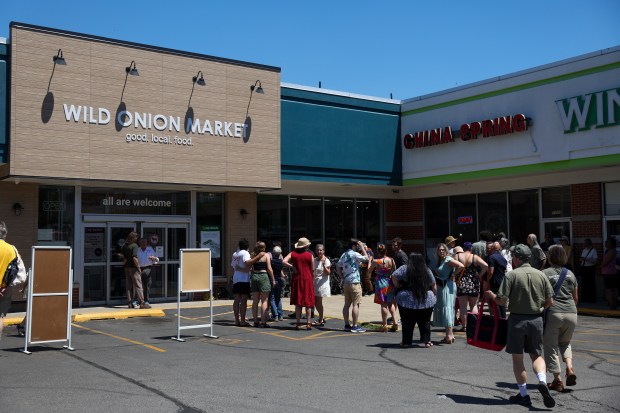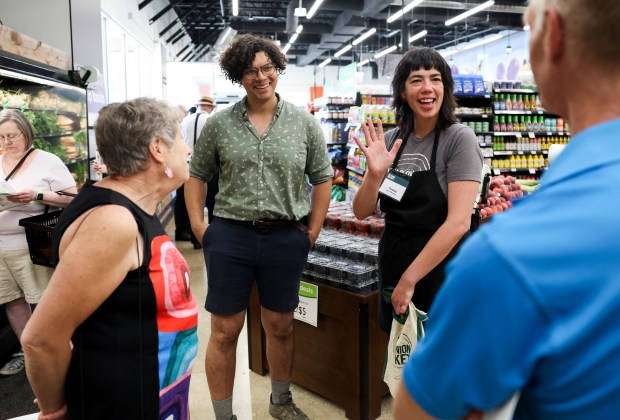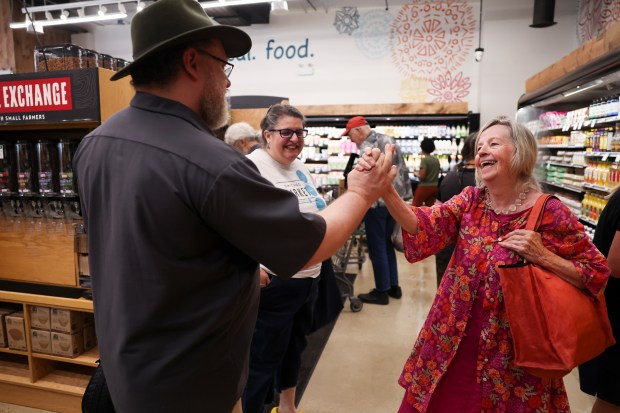After more than a decade of development, planning, fundraising and construction, Rogers Park finally has its own cooperative grocery store. Wild Onion Market opened its doors on June 12 to a crowd of owners and neighbors who packed the store, perusing local produce, bulk dry goods and organic staples. Speeches from the co-op’s board, a ribbon cutting and the dulcet tones of Bengali music band Ochin Pakhi marked the grand opening.
Grocery co-ops are collectively owned businesses, financed by the same people who shop at them. A wave of co-ops popped up in the U.S. in the 1960s as counterculture hubs that married ideas about collective labor and natural foods. These were alternatives to commercial grocery stores, places to get nutritional yeast and Ezekiel bread. Many of these early co-ops required their owners to work in the store for a certain number of hours each month and restricted sales to owners. Some of the co-ops from this era still survive today; the Park Slope Co-op, which opened in 1973 in New York City, is one of the most famous examples.
But despite its size and access to local produce, Chicago has never been a city overflowing with co-ops. The Dill Pickle Food Co-op opened in Logan Square in 2009, followed by the Sugar Beet Co-op in Oak Park in 2015. Wild Onion’s opening, however, might be the first in a wave across the city. Six others are in development, including the Chicago Market in Uptown and the Austin Community Food Co-op.
Wild Onion general manager Teresa Meza is a born-and-raised Chicagoan and a self-professed co-op person who worked at both Sugar Beet and Dill Pickle before heading north to Rogers Park. For her, co-ops are about food sovereignty, which means communities’ control over what they eat and how that food is produced. “Aside from breaking everything down, and then starting over,” co-ops are the best bet for improving our food system, she said.
Mentioning the recent collapse of specialty grocer Foxtrot, she contrasted the collective model to a privately owned one; “If I were to come in and just decide one day to shut down the store, then the board of directors would be like, all right, that’s not what’s going on. There’s a little bit more of a responsibility to the community. There’s a lot more transparency,” she explained.
One of the reasons co-ops are so few and far between in the Chicago area may be the amount of time, money and effort it takes to open one. Mary Meyer, a Rogers Park resident for the last 30 years, was the first owner of the co-op. Meyer grew up on a farm in Ireland, always eating fresh produce.
“I don’t think I ever bought anything frozen. Ever,” she said.
She loved the local produce she could buy at the Glenwood Sunday Market every summer weekend, and began to wonder how she could get food from the same farms year-round. With a few like-minded neighbors, she posted flyers at the farmers market asking who might be interested in opening a co-op.
In 2012, Meyer and her collaborators held a neighborhood meeting about the co-op. A hundred people showed up — plenty of support for the idea. The group incorporated in 2014 as the Rogers Park Food Co-op and got to work. They didn’t imagine at the time that it’d take 10 years to open their doors — “But when you are starting out with zero, and you’re building from that to today, you have to get community buy-in,” Meyers explained. In 2020, the group rebranded to Wild Onion Market, a more inclusive name that reflects Chicago’s indigenous namesake, the shikaakwa, a wild onion plant that used to grow plentifully in the marshy areas by the lake.
Rogers Park’s demographics — lots of renters; younger people who move in and out in the span of a few years — posed challenges to sustained organizing for the co-op. Unlike Logan Square, where the median income is $91,000 a year, the median Rogers Park income is $51,000, according to 2023 reports from the Chicago Metropolitan Agency for Planning. Getting a co-op off the ground in a community with less money to throw around takes time and creativity. It may have helped that, partway through the development process, Wild Onion welcomed a group of owners from south Evanston who’d been trying to start their own co-op, joining the two communities’ forces together.
Jeanne Pyrz has lived in Rogers Park since 1994, when she moved from Winnetka for college. Standing in line to check out at Wild Onion’s opening, she remarked that the space reminded her of the market she grew up with in the north suburbs. But she doesn’t believe the co-op is a sign of gentrification. “People here deserve to have access to local food too,” she said.
Bill Kowalewski-Barrera, who’s has been an owner at the co-op for the past three years, moved to Rogers Park a quarter century ago. He’s seen housing prices rise over the years, but believes Rogers Park will remain diverse and relatively affordable, even as it continues to gentrify. The market, he said, is a kind of gentrification — but the kind that benefits the neighborhood too.
In 2022, the Wild Onion group signed a lease at 7007 N. Clark St. and got to work renovating the space. Now, the store boasts poured concrete floors, a bright seating area, and a mural of butterflies and flowers by Ryan Tova Katz. After raising an eye-popping $3 million from owners, both via the $250 cost for lifetime ownership in the co-op and donations, the group made up the difference with a loan from the local Devon Bank. Many of the investors in the co-op are local businesses, Meyer said, such as Smack Dab and Honeybear Cafe.

Meyer said the store’s over 2,000 owners include people from across the community. Wild Onion doesn’t ask owners to report their income or race when they join, so it’s unclear how closely the store’s ownership represents its neighborhood. But non-members can still shop at Wild Onion — Meza said she wants to encourage ownership without pressuring those who don’t have the means or desire to buy a stake.
Some neighbors have wondered whether Wild Onion might take business from the many grocery stores that already serve Rogers Park. Early in the process of developing the co-op, the board commissioned a market study intended to answer exactly that question. The study showed there was room in the market for a co-op — in other words, according to Meyer, “the pie is big enough.”
Pyrz said she usually shops at Jewel-Osco or Instacart; Kowalewski-Barrera is loyal to Devon Market. Wild Onion will be closer than their typical grocery stores, a place to pop in for a forgotten ingredient on short notice. Until a few years ago, Pyrz didn’t have a car, so she’s acutely grateful to have a grocery store within walking distance. And she was already excited about the ready-made food for sale, thinking ahead to the fall when she’ll have her hands full as a Montessori teacher in Lincoln Park.

Wild Onion’s offerings will include local organic or sustainably grown produce and bulk items (think dry goods like raisins and rice). To some environmentally-minded shoppers, the ability to bring your own bag or jar is a big selling point. Meza hopes Wild Onion will offer shoppers both unique local foods and basics.
“We don’t want you to say, ‘well, I shopped with co-op today, but I’m missing half the things that I would get from my regular groceries,’” she said, stressing that she’ll solicit feedback from customers to make sure the store is well-stocked.
In a neighborhood that boasts many grocery stores that cater to particular tastes — Devon Market for Eastern European goods; La Unica and Supermercado Chapala for Latin American ingredients — Wild Onion will serve shoppers looking for organic, local food.
Charlotte Goddu is a freelance writer.



